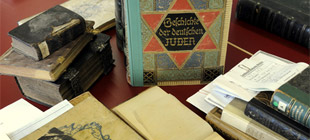Our project: "Looted cultural property"

What is "looted cultural property"?
Between 1933 and 1945 countless numbers of people were persecuted and murdered under the National Socialist regime because of their ethnicity, their religious and political convictions, or their world views. Their property and personal belongings were confiscated, stolen, or otherwise impounded and forcibly sold. Cultural works stolen from individuals and organizations during this period are known as "looted cultural property" or "Nazi plunder" (NS-Raubgut). Archives, museums, and libraries throughout Germany were among the organizations which profited from the confiscations conducted under the National Socialist regime.
Cataloging looted cultural property
An online catalog of the books discovered at the SuUB Bremen was created in 2009.
Libraries served as collection points for banned political literature, and were assigned "gifts" by the Gestapo and the National Exchange Office (Reichstauschstelle). They also received large numbers of books (and entire collections) which were confiscated or plundered by the Wehrmacht in the occupied territories. Holdings of this kind were often designated in the acquisitions records as "gifts", "transfers", or "old stock".
The task of identifying these "acquisitions" today is a difficult and complex one, and requires a considerable amount of research. According to a recent estimate by historian Götz Aly German libraries may still hold around one million stolen books today.
How did the SuUB Bremen come to possess looted cultural property?
Before the outbreak of the Second World War many Jewish families chose to emigrate to escape the persecutions and political terror of the NS-regime. Many of these emigrants left Germany through Bremen's international port. Following the outbreak of hostilities on 1 September 1939, vessels that had already left port were called back to the docks and their cargoes impounded in warehouses, where they were subsequently confiscated by the Gestapo. As a result of this, the belongings of many Jewish families were held in Bremen long after the families had fled to safety. In 1942 their baggage and belongings were publicly auctioned at what were known in official circles as "Jewish auctions". Like other public institutions of the period, the State Library – the predecessor of today's SuUB Bremen – had a right of first refusal, of which it made liberal use. The State Library acquired approximately 1600 books at these auctions; slightly more than 40% of the new titles acquired that year. These items were recorded in the State Library's accessions book with the note "J.A." - an acronym for the term "Jewish Auction".

Fig. 1 and 2: Books acquired at so-called "Jewish auctions" were marked "JA" and assigned a number identifying the auction at which they were purchased (in this case, No. 10).
Image at right: A close-up of the library's 1942 accessions book. The acronym "JA" was noted in the column headed "Origin".
How has the SuUB Bremen addressed this issue?
The SuUB Bremen is committed to its responsibility to locate, identify, document, and return these holdings to their original owners or their heirs.
In the early 1990s, the SuUB became one of the first libraries in Germany to undertake a systematic review of its holdings for stolen items. The search was launched after an academic user stumbled upon a number of books bearing the acronym JA and began to research their origins.
In the aftermath of the subsequent public debate, the state senate demanded that the SuUB Bremen search its holdings for property confiscated from Jewish individuals and families, and return these items to their original owners or their heirs. The following year retired school inspector Elfriede Bannas was commissioned with the task of researching the full extent of the SuUB's looted holdings. The first step in this process entailed a detailed examination of the accession books for this period. With the aid of information gleaned from bookplates and personal inscriptions found in some of the books, researchers were able to identify the original owners of 330 of the 1,500 titles designated as looted cultural property. Since then, the State and University Library Bremen has successfully returned (restituted) 275 of these books to their rightful owners or their heirs. Items of looted cultural property held at the SuUB were restituted immediately following their identification and the necessary provenance research. A special online catalog has subsequently been created detailing all of the 1,600 items identified as potential looted cultural property. These holdings have also been reported to the Lost Art Database, enabling researchers from around the globe to locate them.

Fig. 3 and 4: Handwritten inscriptions and personal details have enabled researchers to identify the owners of some of the books discovered at the SuUB.
The legal framework
In December 1998 an international conference of 44 governments signed the Washington Declaration in which they expressed their commitment to search for and return works of art stolen by the Nazis. In 1999 the German federal and state governments, together with local government umbrella organizations, issued their Common Statement, requiring that public institutions such as museums, libraries and archives, search their holdings for looted items, and return them to their rightful owners. Numerous libraries and other cultural institutions have since assessed their holdings and were able to return looted items to their rightful owners.
In 2007 Bremen's museums, art galleries, libraries and archives issued a joint statement, declaring their intention to review their collections for property stolen by the Nazis and to establish a joint database.

Fig. 5: Following their successful restitution, books are removed from SuUB's catalog.



